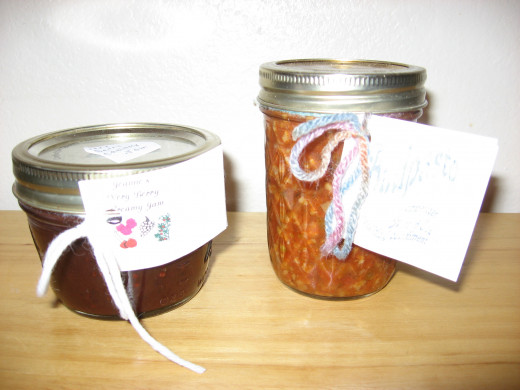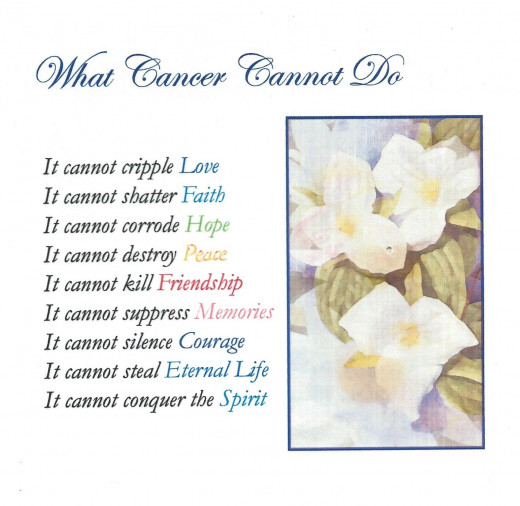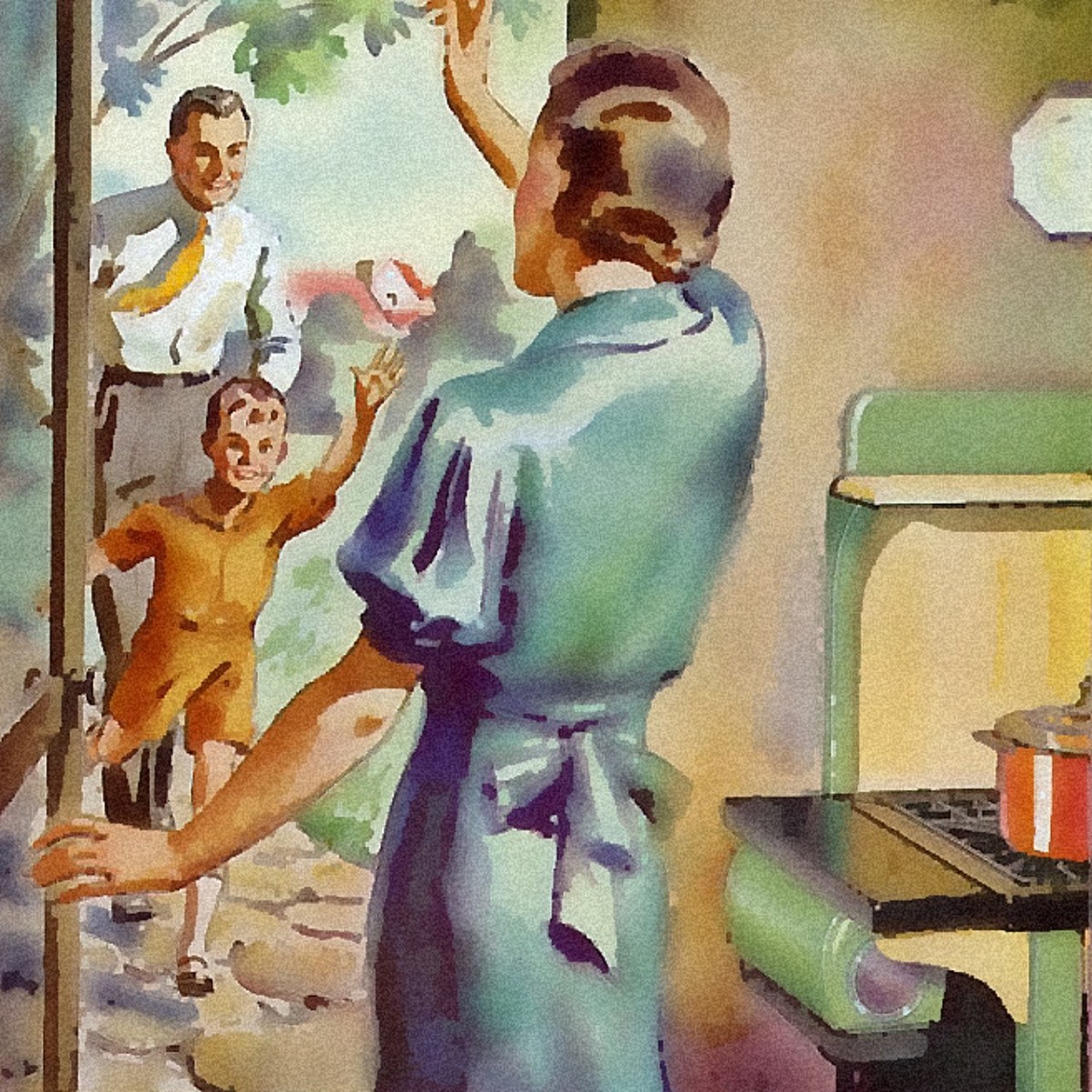What to say to Cancer Patients, Friends or Family

Four Things Needed
There are four things needed in any order to help them through their ordeal, but not in any particular order.
1) Belief in God and that miracles do happen
2) Network of family and friend
3) A good medical team
4) A positive attitude
You need your friends and family near. This is scary and you need this comfort. You don’t always have to do anything, except hold their hand, hold them when they cry, show you care.
Tell Family and Friends
After this news, do not stay away, now is when they need you. Tell friends and family you know, keep in touch with the patient and keep friends informed of what is going on.
When the news that your family member or friend has the big ‘C’ you know that this will be a life-threatening event and will bring a change to everyone involved.
This is going to be the awkward time for each of you. What do you do?
You treat them just as you would when they were healthy. You call them up on the phone and talk about the same thing you talked about before they got ill.
Yes, they feel ill, tired and nauseous but they still need ordinary things to happen every day. Conversation is one of the things you can do to keep them in touch with what is happening. Office gossip is good, takes their mind on everyday things.
They won’t be going out to dinner or to the club, bowling, parties, or anywhere else. They are susceptible to getting colds, flue, sniffles coughs and they can’t afford to be exposed.
Medical Team
Your medical team is very important, Ask Questions and keep asking until you understand what your doctor is saying.
- Ask about their medical team: oncologist, nurses, doctors and hospital are they comfortable and pleased with what is happening?
- They need to have faith in what is being done.
- Get information; know what is happening ahead of time. The Internet is great for finding out and researching information. A person will heal well and in good time if they have faith in their medical team. The patient needs to know that their medical team is doing the best they can. If there is doubt – suggest a change or find out more information what that doubt is and see if you can change that doubt to a positive tone.

Take Time
Be considerate and always call first before showing up to visit. They may be having a bad day and don't want company.
- If the patient is home, call and ask when a good time to visit. Don’t go the day after they have had their treatment, usually they are extremely tired and feel bad. Wait and call and ask if they feel up to you dropping by or when can you stop in and visit.
- Don’t be offended if you are told ‘not today’. Ask if they would like you to visit.
- Check before you visit, they can tell you if they are too ill to visit.
- Don’t expect too much of them, let them know you are there to comfort them, not to be entertained.
- You prepare the tea or bring it with you.
- If they are in the hospital, don’t everyone visit at once. Visiting is very tiring. Let everyone have a moment with him or her. Be positive; do not be grumpy or jumping up and down with happiness. They are going through difficult times be considerate.

Subjects to Avoid
Cancer patients are concentrating on getting well, they are very ill, weak, susceptible to illness, some depression and are very vulnerable. Take care and keep in mind that you are there for 'them' not for yourself. Listen carefully and be helpful - but not pushy.
- Do not tell them about your sister, aunt, uncle, daughter and grandchild that had cancer and what they went through.
- Do not talk about someone else’s illness. This is not what a patient wants to hear at this time. Stay away from talking about other people’s health. They are in a crisis and need love, concern and don’t need to hear about someone else’s other life threatening problems.
- Don’t say you know how they feel – even if you have had the same thing.
- Stay away from “Let me tell you what you should do”.
- Do not reassure them they are going to be fine – only God knows this.
- Definitely do not ask how much time the doctor gives you or what’s your prognosis. They can tell you that voluntarily if they want.
- Do not ask, “what can I do for you”, instead read further on How Can I Help?
Can I Help?
You want to help, but feel uncomfortable and don't know what to say, try these:
- If you want to talk about health, ‘ask them about theirs’.
- How are you feeling?
- Tell them, if you want to talk – I am here for you.
- Is there something I can do for you, something that you need or want but can’t do yourself?
- If you are really uncomfortable with telling them and you don’t know what to say or do, but you love them and want them to know this – say it. Honesty is always good.
- Say you will phone, if they want to talk okay, but they may not feel up to it, don’t be ticked off or hurt. Make them your concern not how you feel.

Reasonable and Practical Help
There are many things you can do to make them feel better. Concentrate on them and be helpful. Try to keep your concerns quietly to yourself. Below are listed a few things that you can help them out with, and I'm sure you can think of more.
- Hold their hand, brew a cup of tea, and better yet bring with you something you know they like to drink. Even if they can’t drink it because they don’t feel good at that moment, don’t be upset – the thought was enough for them to know you love them.
- Do chores; sweep the floor, dust, take out the garbage, go to the grocery store.
- Take them a glass of water. Give them a hug. Listen to what they want to talk about.
- Do they have children, baby-sit them, take them to the playground, and pick them up from school.
- Make phone calls, pick up prescriptions.
- Help them with everyday things, such as prepare a meal for their family. Wash the dishes.
- Do the laundry; ask what other things they need.


Positive Attitude
Reinforce a positive attitude. Remain positive, do not visit and spend your time crying. They are probably feeling bad, ill and more than likely depressed. They need to be bolstered up, to be positive so they can heal.
- If they want to cry hold them and cry with them until they feel better, sometimes crying together eases the pain and tension.
- If they want or need to, pray with them.
- Ask if they want read aloud to them while they are lying down, this can help them heal.
- Maybe you know they like certain music take them a CD and play it for them, this will help relax and can be soothing.
- Talk to them about positive things, for a positive attitude can help and aid healing.
- If you can’t think of anything positive, look outside – is the sun shining? That’s positive.
- Is it softly raining, rain can be very soothing – that’s positive.
- Look for little everyday things, these are all positive.
- Are they taking the treatment well – that’s positive.
- What did the doctor say about how things were going? Usually this is positive – doctors like to report positive results.
- Do they look better today – that’s positive.
- Maybe a cup of hot chocolate – always smells good – that’s positive.
- Ask if they need a blanket, they might be chilly, getting warmer is better and comforting.
Foods
This is probably not the best time to be talking about how tasty food is or how good it is for them. A cancer patient does not usually want to eat.
- At this time a lot of cancer patients don’t feel much like eating.
- They have to eat and drink a certain amount – every day, especially if they are taking chemo, encourage them to drink water and eat, even if it’s just several bites.
- Sometimes chemo makes food tastes like sawdust; so most foods aren’t going to taste good. Never mind that, if they will encourage them to eat ice cream, Jell-O, or something easy to swallow. Don’t be upset if they don’t eat what use to be their favorite food, for it probably doesn’t taste good to them now.
- If the patient takes a certain kind of chemo, nothing is going to taste good. Most of what I ate had no taste. I ate and drank because if you don’t the chemo can damage kidneys and liver.
- Encourage them to eat small amounts 5 – 6 times a day with lots of water in between. Sips are fine – just encourage many sips.


Gifts
Showing you care in the form of a small gift sometimes just makes you feel good. Try it!
- CD’s of their music likes.
- Magazines, newpapers, books, cards.
- Movie’s, documentaries that they have talked about or you know they like.
- If they can have flowers or a plant. But, ask first to see if they can have them, sometimes we just can’t have these them, even though we love them.
- Give a gift certificate of their favorite place to eat or go to such as a spa. Make sure it does not have a date, because it might be some time before they are able to use it.
- Have someone clean his or her house or you do it.
- Give a warm bathroom and slippers.
- Do they do puzzles? Give them a puzzle book, crossword, soduko. They can always use them later if not now. (Sometimes the chemo gives you chemo brain – where you can’t think very well. This is when you can’t do those puzzles, but they will come in handy when they can do them.)
- Shampoo their hair or give lotion (check to see if there is any they can’t use) give a back rub.
- Give a binder or journal to keep notes.



